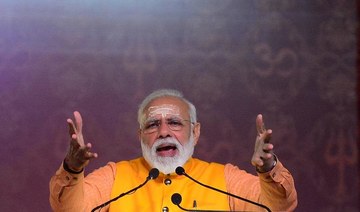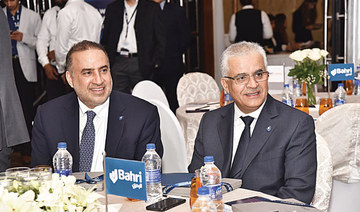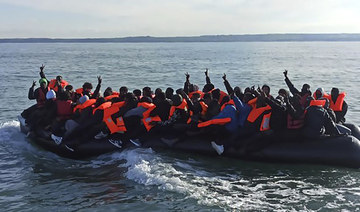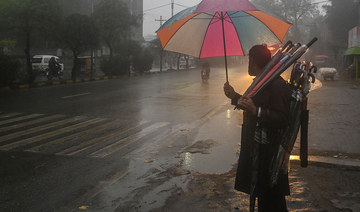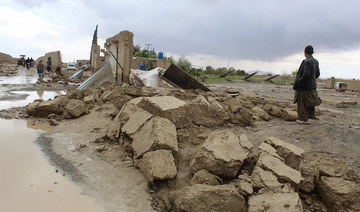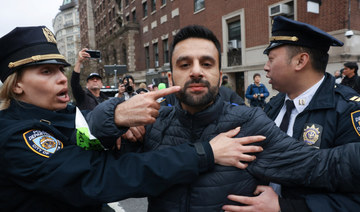VARANASI, India: It’s a project dripping with equal parts symbolism — Modi, the devout Hindu, restoring the ancient connection between two religious icons — and political calculation. In his five years as prime minister, Modi has pushed to promote this secular nation of 1.3 billion people and nine major religions — including about 170 million Muslims — as a distinctly Hindu state.
The $115 million promenade is just one of a number of Modi’s religious glamor projects, aimed squarely at pleasing his Hindu nationalist Bharatiya Janata Party’s base ahead of elections that start on Thursday. While India is majority Hindu, critics say such projects undermine India’s multiculturalism, potentially stoke religious tension, and come at the expense of far more pressing infrastructure needs.
The project is also part of a larger Hindu nationalist effort to erase evidence of India’s diverse past.
Modi, 68, has long understood how politics and religion intertwine in Varanasi. Despite hailing from the western state of Gujarat, he has chosen to run for a second time as the parliamentary candidate for Varanasi.
There are those who say the money could have been better spent in one of the world’s oldest living cities, where men relieve themselves in public on trash-strewn streets and sewage flows into the Ganges near religious bathers, funeral pyres and crowds of devotees who gather by its waters for nightly prayers.
And some Varanasi Muslims fear the project could embolden Hindu hard-liners who have demanded for decades that the 17th century Gyanvapi mosque — which they claim was built over an earlier Vishwanath temple demolished in the Mughal era — should itself be torn down.
The demolition of around 300 commercial and residential buildings to make way for the promenade has left a gaping hole in Varanasi’s urban core, a congested maze of zig-zagging brick lanes full of religious shrines.
Outside the heavily guarded temple and mosque complex ringed with barbed wire, where photography is prohibited, Aijaz Mohammed Islahi, the mosque’s caretaker, said he fears the new clearing could allow right-wing Hindus to form a mob and attack the mosque.
Around a Hindu festival day in March, Islahi said, a group tried to install a Hindu statue near the mosque to assert a claim on the property.
“They thought they would quietly garland the statue and people will accept the change after a couple of days,” he said.
The Vishwanath project is part of a broader campaign to downplay the Muslim Mughal dynasty’s place in Indian history. The campaign includes restoring the Hindu names of cities that were renamed by Mughals centuries ago and excluding the Taj Mahal, a Muslim tomb, from government tourism materials.
At the same time, Hindu nationalists are demanding that a temple to the god Lord Ram be built at the site of a mosque rioters destroyed in 1992 that they say was built only after Muslims destroyed an ancient temple there.
Thus, Modi’s messaging around the Vishwanath temple project is hard to miss.
“Enemies had their sight on Shri Kashi Vishwanath. Many a times it was under attack,” Modi said at a promenade groundbreaking ceremony in March. “But there is power in the faith here and this great temple continues to give strength to people.”
Deepak Agarwal, the city commissioner overseeing the Vishwanath project, said that residents had been paid at least twice the market rate for their properties and that no one had been forced to leave.
Modi’s directive was “to restore the glory back to this area,” Agarwal said, including rehabilitating about 40 Hindu temples or shrines uncovered in the demolition, and investing in public amenities.
Though Varanasi draws millions of devout Hindus each year, scholars and residents emphasize its identity as a city where people of many faiths have long lived together harmoniously.
But the temple project is a BJP-led effort to stamp India’s Hindu mores onto a multicultural society, historians and political scientists say.
“It’s a bid to rewrite the ground rules of Indian republican politics by either implicitly or explicitly arguing that India needs to be remade as a state defined by its majority faith,” said writer and professor Mukul Kesavan.
Other examples abound. Last October, Modi unveiled another dream project: a statue in Gujarat of Sardar Vallabhbhai Patel, an Indian independence leader, politician and Hindu. The Statue of Unity is the world’s largest, almost twice as high as the Statue of Liberty.
And in January, the central government in New Delhi and the BJP-led government of Uttar Pradesh state spent an unprecedented $650 million on a Hindu mega-fest, advertising the event on CNN and plastering the festival grounds with posters of Modi and the state’s chief minister, Yogi Adityanath, a Hindu monk who was arrested but not prosecuted for allegedly inciting a deadly 2007 anti-Muslim riot.
Modi’s BJP took power in 2014 elections on a pledge to rapidly expand India’s economy.
A master marketer, Modi has branded some government programs as personal successes — constructing millions of toilets to reduce open defecation, and improving roads and electricity in rural areas — while distancing himself from failures.
But in the lead-up to the polls, his government’s economic performance has come under scrutiny.
Modi’s administration was accused in January of suppressing unemployment data that showed joblessness had reached its highest level in 45 years.
A demonetization program aimed to curb black market money by taking some rupee notes out of circulation. But it ultimately hurt the poor, and India’s central bank later said that most of the illicit funds had re-entered the banking system.
Public subsidies to support India’s distressed agricultural sector failed to stem a pattern of suicides among farmers facing mounting debt for purchases of seeds, fertilizer and cattle feed.
Even in Modi’s constituency of Varanasi, the government’s record is uneven, most visibly on the prime minister’s signature Swachh Bharat, or Clean India, program.
But with the Vishwanath temple and other symbolic projects, one of Modi’s undisputed successes has been to insert religion into the center of the political debate in India.
Even leaders of the opposition Congress party, which has stood for secularism since before India’s independence, are trying to prove their Hindu credibility.
Priyanka Gandhi, sister of Congress party leader Rahul Gandhi, spent three days in March traveling by boat on the Ganges, a trip billed as a “yatra,” or religious journey, that culminated with a visit to the Vishwanath temple in Varanasi.
Yet criticizing Modi’s development projects, she said that “the prime minister should stop thinking that people are fools,” and “should understand that they see through this,” arguing that the prime minister’s showmanship lacks substance.
In the demolition zone, Sonu Khanna sits cross-legged amid stacks of pashmina shawls and silk saris.
Khanna and his siblings, parents and grandfather live and run a wholesale garment business near the Vishwanath temple that deeds on weathered paper show the family has owned since Mughal times.
If the government offers them cash to move, the Khannas, practicing Hindus, will probably join most of their neighbors uprooted in Modi’s dream project.
But Modi won’t have won their votes.
“Friends and family used to live all around us, and now we’re alone in all this dust and noise,” 25-year-old Khanna said.
For India’s prime minister, symbolism is political strategy
For India’s prime minister, symbolism is political strategy
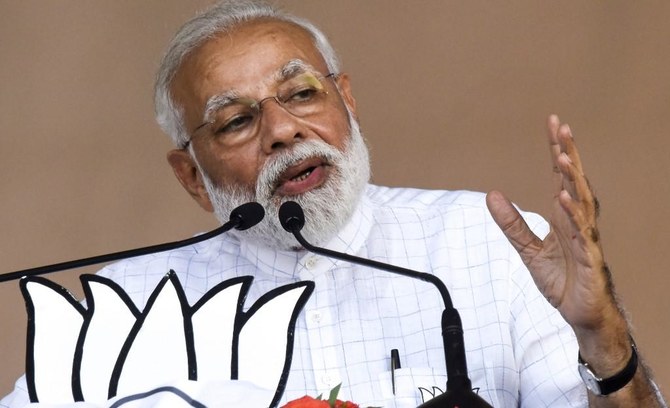
- Critics said Modi’s $115m promenade might create religious and cultural tensions in India
- Muslims in Varanasi are worried the new project will incite Hindu hard-liners against other religions
Macron blasts ‘ineffective’ UK Rwanda deportation law
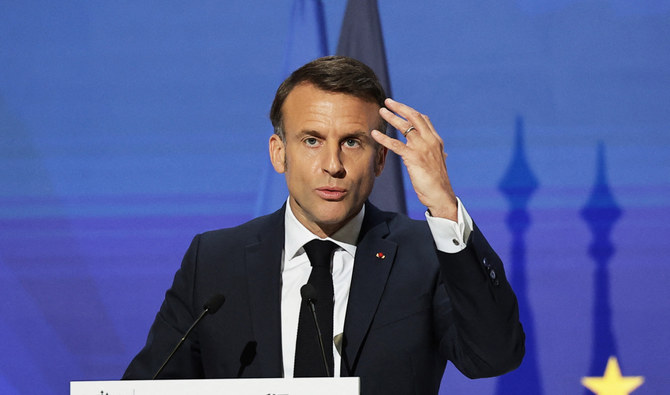
PARIS: French President Emmanuel Macron on Thursday said Britain’s plan to send asylum seekers to Rwanda was “ineffective” and showed “cynicism” while praising the two countries’ cooperation on defense.
“I don’t believe in the model ... which would involve finding third countries on the African continent or elsewhere where we’d send people who arrive on our soil illegally, who don’t come from these countries,” Macron said.
“We’re creating a geopolitics of cynicism which betrays our values and will build new dependencies, and which will prove completely ineffective,” he added in a wide-ranging speech on the future of the European Union at Paris’ Sorbonne University.
British MPs on Tuesday passed a law providing for undocumented asylum seekers to be sent to Rwanda, where their asylum claims would be processed and where they would stay if the claims succeed.
The law is a flagship policy for Prime Minister Rishi Sunak’s government, which badly lags the opposition Labour Party in the polls, with an election expected within months.
Britain pays Paris to support policing of France’s northern coast, which aims to prevent migrants from setting off for perilous crossings in small boats.
Five people, including one child, were killed in an attempted crossing Tuesday, bringing the toll on the route so far this year to 15 — already higher than the 12 deaths in 2023.
But Macron had warm words for London when he praised the two NATO allies’ bilateral military cooperation, which endured through the contentious years of Britain’s departure from the EU.
“The British are deep natural allies (for France), and the treaties that bind us together ... lay a solid foundation,” he said.
“We have to follow them up and strengthen them because Brexit has not affected this relationship,” Macron added.
The president also said France should seek similar “partnerships” with fellow EU members.
US alarmed by signs of ‘imminent military offensive’ in Darfur

WASHINGTON: The US has warned of a looming rebel military offensive on the Sudanese city of El-Fasher. This humanitarian hub appears to be at the center of a newly opening front in the country’s civil war.
After a year of fighting between the armed forces of Gen. Abdel Fattah Al-Burhan and the paramilitaries of the Rapid Support Forces, under Gen. Mohammed Hamdan Dagalo, millions have been displaced in the northeastern African country.
Until recently, El-Fasher — the last Darfur state capital not under RSF control — had been relatively unaffected by the fighting, hosting a large number of refugees.
But since mid-April, bombardments and clashes have been reported in the city and surrounding villages. The US “calls on all armed forces in Sudan to immediately cease attacks in El-Fasher,” the State Department said.
“We are alarmed by indications of an imminent offensive by the Rapid Support Forces and its affiliated militias,” it said, adding that “an offensive against El-Fasher city would subject civilians to extreme danger.”
After several days of “arbitrary shelling and airstrikes” in the city and its outskirts, a pro-democracy lawyers’ committee reported last week that at least 25 civilians had been killed.
Clashes in the eastern and northern parts of the city have already resulted in 36,000 displaced people, according to the UN’s Office for the Coordination of Humanitarian Affairs.
As the war enters its second year, the UN and US have warned the breakdown of the fragile peace in El-Fasher would be catastrophic.
The city functions as the main humanitarian hub in the vast western region of Darfur, home to around a quarter of Sudan’s 48 million people and the site of harrowing violence during this and previous conflicts.
The State Department said it had seen “credible reports” that the RSF and affiliated militias had razed multiple villages west of the city, while it condemned “reported indiscriminate aerial bombardments” in the region by Sudan’s armed forces.
Death toll in migrant boat capsize off Djibouti rises to 24: UN agency
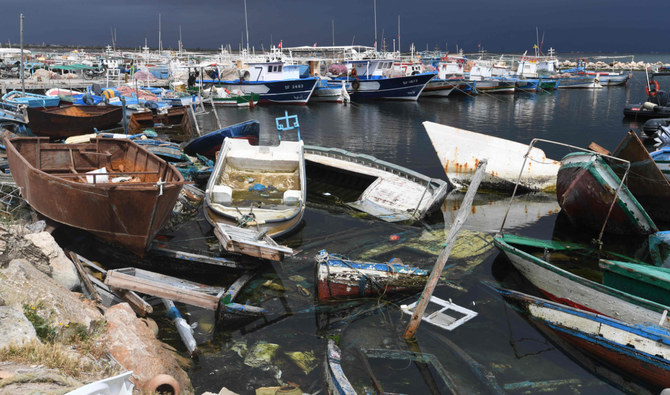
- 20 remain missing after the boat carrying at least 77 migrants, including children, capsized near the town of Obock
NAIROBI: The death toll from a migrant boat disaster off Djibouti this week has risen to 24, the UN’s migration agency said, highlighting a sharp increase in the number of people returning from Yemen to the Horn of Africa nation this year.
The capsize on Monday was the second fatal maritime accident in two weeks off Djibouti, which lies on the perilous so-called Eastern Migration Route from Africa to the Arabian Peninsula.
At least 24 people died, and 20 remain missing after the boat carrying at least 77 migrants, including children, capsized near the town of Obock, the International Organization for Migration said.
It said 33 survivors were being cared for at an IOM center in Obock and that local authorities are conducting search and rescue operations in the hope of finding more people alive.
Addis Ababa’s ambassador to Djibouti had said those on the boat were Ethiopian migrants.
Another vessel also carrying mainly Ethiopian migrants sank in the same area on April 8, with a death toll of at least 38.
“The occurrence of two such tragedies within two weeks highlights the dangers faced by children, women, and men migrating through irregular routes, underscoring the importance of establishing safe and legal pathways for migration,” IOM chief of mission in Djibouti, Tanja Pacifico, said.
The IOM said it had recorded a total of 1,350 deaths on the Eastern Route since 2014, not including this year.
In 2023 alone, it said it documented at least 698 deaths along the route, including 105 lost at sea.
The agency believed the people on both ill-fated vessels were attempting to return from Yemen to Djibouti.
Each year, tens of thousands of African migrants brave the Eastern Route across the Red Sea to reach Gulf nations, escape conflict or natural disaster, or seek better economic opportunities.
However, many are unsuccessful and “thousands are stranded in Yemen where they experience extremely harsh conditions,” the IOM said.
Since the start of 2024, the agency said 3,682 migrants have left Yemen for Djibouti, more than double the figure for the same period last year.
155 killed in Tanzania as heavy rains lash East Africa
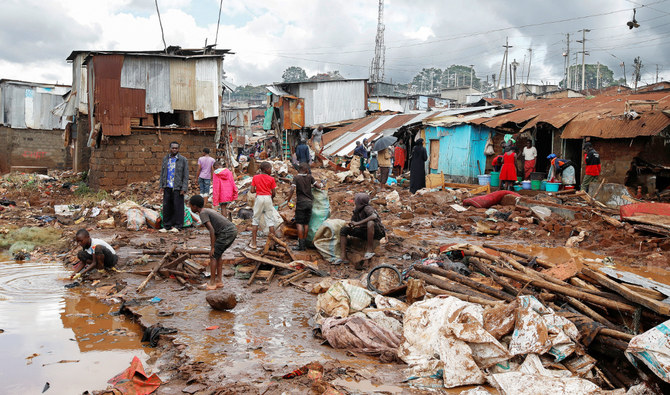
- Kenyan president convenes emergency multi-agency meeting to respond to crisis after floods cause chaos
DAR ES SALAAM, Tanzania: At least 155 people have died in Tanzania as torrential rains linked to El Nino triggered flooding and landslides, Prime Minister Kassim Majaliwa said on Thursday.
Tanzania and other countries in East Africa — a region highly vulnerable to climate change — have been pounded by heavier than usual rainfall during the current rainy season, with dozens of deaths also reported in Kenya.
Majaliwa said the rains have affected more than 51,000 households and 200,000 people, with 155 fatalities and 236 injuries.
“The heavy El Nino rains, accompanied by strong winds, floods, and landslides in various parts of the country, have caused significant damage,” Majaliwa told parliament in Tanzania’s capital, Dodoma.
He added: “These include loss of life, destruction of crops, homes, citizens’ property, and infrastructure such as roads, bridges, and railways.”
El Nino is a naturally occurring climate pattern typically associated with increased heat worldwide, drought in some parts of the world, and heavy rains elsewhere.
It can have a devastating impact on East Africa.
In Burundi, around 96,000 people have been displaced by months of relentless rains.
In addition, about 45 people have been killed in Kenya since the start of the rainy season in March, including 13 who lost their lives in flash floods in the capital, Nairobi, this week.
Kenyan President William Ruto convened an emergency multi-agency meeting on Thursday to respond to the crisis after torrential rains triggered floods that caused chaos across the city, blocking roads and bridges and engulfing homes in slum districts.
Kenyans have been warned to stay on alert, with more heavy rains forecast across the country. Officials said people living in the most vulnerable areas would be relocated.
“The government ... will do whatever it takes, apply all the required resources in terms of money and personnel to make sure that lives are not lost and the people of Kenya are protected from this disaster,” Deputy President Rigathi Gachagua told a press briefing.
Meanwhile, the UN humanitarian response agency OCHA said in an update this week that in Somalia, the Gu (April to June) rains are intensifying, with flash floods reported since April 19.
It said four people had been reportedly killed, and at least 134 families or more than 800 people were affected or displaced across the country.
Late last year, more than 300 people died in torrential rains and floods in Kenya, Somalia, and Ethiopia just as the region was trying to recover from its worst drought in four decades that left millions of people hungry.
From October 1997 to January 1998, massive floods caused more than 6,000 deaths in five countries in the region.
In March, the UN’s World Meteorological Organization said that El Nino, which peaked in December, was one of the five strongest ever recorded.
Though the weather pattern is gradually weakening, its impact will continue over the coming months by fueling the heat trapped in the atmosphere by greenhouse gases, it said.
Therefore, the WMO said in a quarterly update that “above normal temperatures are predicted over almost all land areas between March and May.”
‘Uncommitted’ organizers will join campus protesters in Michigan over Gaza
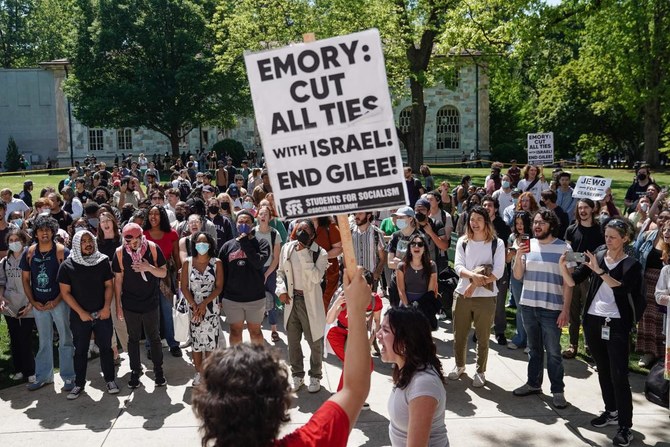
- Student protests in the US over the war in Gaza have intensified and expanded over the past week
- Democrats have become increasingly uneasy over the US support for Israel as the death toll and destruction climb in Gaza
WASHINGTON: Organizers behind the “uncommitted” political movement against President Joe Biden’s staunch support for Israel’s war against Hamas will travel to the University of Michigan’s campus on Thursday to join students protesting the war.
Student protests in the US over the war in Gaza have intensified and expanded over the past week after police first arrested students at Columbia, with so-called Gaza solidarity encampments established at colleges, including Yale, and New York University. Police have been called in to several campuses to arrest hundreds of student demonstrators.
Uncommitted organizers will travel to the University of Michigan’s Ann Arbor campus, they told Reuters, bringing together a political movement that’s disrupted Biden events and amassed hundreds of thousands of votes in Democratic primaries and a student movement that’s drawn students and faculty of various backgrounds.
Biden won Michigan by less than a 3 percent margin in 2020.
Democrats have become increasingly uneasy over the US support for Israel as the death toll and destruction climb in Gaza. A growing revolt inside the Democratic base signifies the challenge Biden faces in bringing together the coalition he needs to defeat Republican frontrunner and former President Donald Trump.
“President Biden is choosing to put his hands over his ears and ignore the hundreds of thousands of people who have already come out against the war at the ballot box,” said Abbas Alawieh, a prominent “Uncommitted” organizer, who is going to Ann Arbor with Layla Elabed, another Michigan organizer.
“Signing into law more money for Israel is sending a clear message to uncommitted voters, young voters that he doesn’t care to engage seriously with our demands to end this war,” he said, referring to the $26 billion in new aid Biden recently approved.
Alawieh said the uncommitted movement has not been coordinating with student groups so far. “We have an electoral focus, but we certainly see the demands of student protesters, who are calling for peace,” he said.
On campuses where protests have broken out, students have issued calls for a permanent ceasefire in Gaza, an end to US military assistance for Israel, university divestment from arms suppliers and other companies profiting from the war, and amnesty for students and faculty members who have been disciplined or fired for protesting.
Biden told reporters on Monday that he condemned both “antisemitic protests” and “those who don’t understand what’s going on with the Palestinians.” Biden campaign spokeswoman Lauren Hitt has said the president “shares the goal for an end to the violence and a just, lasting peace in the Middle East. He’s working tirelessly to that end.”
Trump called the campus protest situation “a mess” as he walked into his criminal trial in New York.
The uncommitted movement amassed sizable vote totals in Michigan, Minnesota and Hawaii primaries and had won 25 delegates as of the beginning of April. They are preparing to target the Democratic National Convention in Chicago in August, where Biden is expected to be nominated.
Polls show Biden and Trump running neck-and-neck ahead of their Nov. 5 election rematch nationally. Biden’s 2020 victory was due to narrow wins in key swing states like Michigan.



